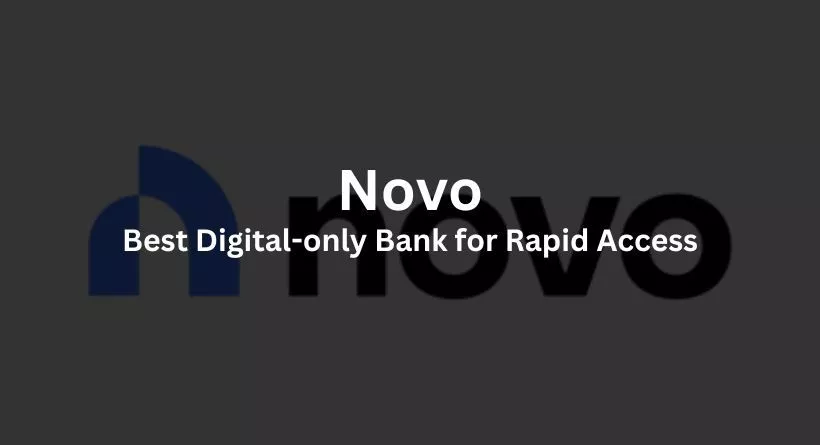The best banks for new companies will provide a variety of services and products tailored to their needs, including a low- or no-fee checking account. To help younger firms develop and expand, they should also provide excellent financial solutions like loans and lines of credit.
Additionally, they need to provide goods and services that contribute to the development of all enterprises, including new ones. You need goods and services that can expand with your business.
Here are the 5 best banks for a startup business, with links directly to the provider:
- Chase: Best overall bank for startups with full-service banking
- Novo*: Best digital-only bank for rapid access to funds and faster payments
- Mercury*: Best digital bank for larger-scale incorporated startups
- Bluevine*: Best for earning interest on smaller balances and best business line of credit
- Bank of America: Best for ongoing rewards and low cash deposit fees
Chase: Best Overall Bank for Startups with Full-service Banking
What We Like
- Open an account and get a bonus of up to $500.
- Low, ignorable monthly cost
- QuickAcceptSM card processing included right inside the Chase MobileR app
Drawbacks
- Free purchases are capped at a certain quantity.
- No refunds for cash machine costs
- Deposits in excess of $5,000 in cash every statement period incur a fee.
Features
- Control how your workers’ debit, deposit, and ATM cards are set up.
- The mobile app allows users to deposit checks, check account balances, pay bills, and transfer funds.
- Compatible with the industry standard accounting package, QuickBooks
- If approved, you’ll get a free debit card in the mail within 10 business days.
- Expenses associated with ordering physical checks
- The Merchant Services of Chase
- Assistance from a real person, in person or online, during regular business hours
- Savings accounts, CDs, loans, credit cards, merchant services, and debt collection are some of the other goods available to businesses.
When To Choose Chase
- You want the full range of services available at a conventional bank.
- You find that having branch and online options is most useful.
- That one bank where you may do all your financial needs, personal and professional
Chase is the ideal choice for young companies in need of a typical bank’s complete suite of services. There are three business checking account tiers available, each having a monthly charge that may be waived as your company expands. Because of this, it is often regarded as an excellent option for small businesses’ primary banking needs.
It also offers cutting-edge point-of-sale (POS) systems, software, and credit products, as well as credit cards (for the best credit cards, check out our ranking of Chase credit cards). Chase offers business financing options, such as commercial real estate loans, via J.P. Morgan. J.P. Morgan also provides merchant services, business credit cards, cash management, and payment processing.
If you’re just starting out and need a business checking account, or if your company has already expanded and requires a wider selection of business banking products and services, Chase has you covered.
You may also like reading: Best Banks for Real Estate Investors In 2023
Novo: Best Digital-only Bank for Rapid Access to Funds & Faster Payments

What We Like
- There are no ongoing costs
- All ATM costs are reimbursed
- You may get your money more quickly with the help of Novo Boost and Express ACH.
Drawbacks
- Cash deposits are currently unavailable
- Shortage of bank accounts and credit options
- Inactive Savings Account
Features
- Compatibility with other popular business apps including: Shopify, Stripe, Square, PayPal, Wise, and Xero
- Use Novo Reserves to save money for taxes and other significant company expenditures.
- Make mobile cheque deposits right from your app.
- Invoicing and bill payment are limitless with online banking.
- By integrating with Stripe, Novo Boost expedites the transfer of payments.
- Express ACH allows you to receive or make ACH payments on the same business day.
- Instant access to a virtual debit card; users get one real card at no cost.
- The software allows users to instantly mail paper checks.
- Help for customers in real time from trained specialists
Reasons to Pick Novo
- You’re a Stripe user who values prompt payment access, and you’ve heard that Novo Boost can help you out.
- Your company uses automated teller machine withdrawals regularly.
- You aren’t looking for a business checking account that pays interest or offers loans from your bank.
Novo is a wonderful banking alternative for startups who get recurring payments via Stripe. With Novo Boost, you may be paid from Stripe much more quickly than with other services. Express ACH, available via Novo, facilitates the instantaneous transfer of funds through ACH. Novo’s speed in both receiving and sending payments is a major benefit over other fintech solutions.
Novo is great for new businesses since it reimburses all ATM costs at the end of the month, making it ideal for companies that make frequent ATM withdrawals. It also has great accounting and payment software interfaces, allows for limitless invoicing, and comes with up to 10 reserve accounts. Novo doesn’t allow you to purchase checks, but the app does let you to mail paper checks.
If you want to deposit cash, there are no fees associated with using the app, but you will need to use a money order. The US Postal Service (USPS) offers money orders for up to $1,000 at retail locations for a fee of up to $2.40.
Novo also has no loan products, which is a major shortcoming. In general, it is a great choice for new businesses, and particularly those that use ATMs often.
Mercury: Best Digital Bank for Larger-scale Incorporated Startups
What We Like
- There is no account opening deposit requirement.
- Both plastic and digital bank cards
- For investments exceeding $250,000, this Treasury product provides an exceptional return.
Drawbacks
- Limited liability companies and trusts are not eligible for these accounts.
- Can’t write checks on paper.
- Few borrowing alternatives and no deposits allowed
Features
- If you have more than $250,000 in Mercury accounts and you want to earn interest, you may request Mercury’s Treasury product.
- Make sure your team has access to the client database.
- Establish a system of automatic account transfers.
- Accounting software like QuickBooks and Xero may be integrated.
- Debit cards may be used online immediately, and plastic cards will arrive in the mail within a few days.
- No more paper checks
- Support for Shopify, Stripe, Zapier, Amazon, and PayPal in commercial settings
- Support requests may be sent through email.
- Opening a checking account also opens a savings account.
- Mercury also offers a variety of credit card, capital, and venture financing, and other financial solutions.
When To Choose Mercury
- Entrepreneurs that are comfortable banking with their financial institution only online
- Non-deposit-required businesses
- Businesses in the startup and technology industries who want to avoid bank fees
Mercury was developed as a banking solution for businesses in the technology and innovation sectors. There is no minimum deposit or account balance required to open a checking or savings account.
Mercury’s newest feature, Vault, is its greatest strength. Mercury will utilise its sweep network and the FDIC to increase your insurance coverage to $5 million.
An interest-bearing account, Treasury is available from Mercury as well. It is restricted to clients having at least $250,000 in Mercury accounts and now earns up to 4.92% APY, however the bank anticipates that this will rise in tandem with the prime rate.
Also, there is an infinite number of virtual cards and 1.5% cash back on all transactions using the provider’s IO Mastercard. Our Mercury IO Mastercard review has further information.
In addition to its excellent software integrations, Mercury also has a rewards page where you may promote discounts for your company. Except for sole proprietorships and trusts, most US-based firms may open a business bank account.
Using any of the more than 55,000 Allpoint ATMs is free of charge. Withdrawals from non-Mercury ATMs are free of charge from Mercury, however you may incur costs from other institutions.
The lack of deposit options and other loan types (beyond credit cards and a venture capital term loan programme) are negatives. If you’re a startup in need of a digital-only bank, Mercury is your best bet.
Bluevine: Best for Earning Interest on Smaller Balances & Best Business Line of Credit
What We Like
- Accounts with balances of $250,000 or less generate interest and are compatible with QuickBooks.
- Superior Revolving Credit Product
Drawbacks
- No checking, savings, or monetary market accounts
- There are no actual branch offices.
- Each bank account may only have one debit card.
Features
- There is no ongoing service charge
- There is no obligatory minimum balance.
- Free annual chequebook reorders and debit card
- Compatible with both Xero and QuickBooks
- Integrates with popular e-commerce platforms including Stripe, PayPal, and Expensify
- Provides real-time assistance from trained experts
- provides a credit line
When To Choose Bluevine
- You want your business checking account to accrue interest and it fulfils one of Bluevine’s two criteria for doing so.
- You should apply for a line of credit; if you own a small company, we recommend Bluevine.
- Considering that you’re only comfortable banking virtually.
Bluevine is an excellent option for entrepreneurs seeking an online-only financial provider with interest-bearing checking and the greatest line of credit product available on the market. With a $250,000 minimum balance and either $500 in monthly debit card purchases or $2,500 in monthly customer payments, the business checking account pays an annual percentage yield (APY) of 2.0%.
Bluevine’s lack of monthly fees, transaction fees, minimum initial deposit, and minimum balance requirement makes it attractive to startups. Two free annual chequebook orders are included, and it integrates well with a variety of popular software packages.
With the latest update, Bluevine now supports international payments to 32 countries in 14 different currencies. For international wire transfers, the fee is $25 + 1.5% of the amount being sent if the currency is not US dollars (USD). You may see the list of supported countries for international payments on Bluevine.
At a Green Dot retail store only, you may deposit cash for a flat fee of $4.95. In addition to the costs assessed by the ATM operator, Bluevine levies a $2.50 fee for withdrawals made from non-Bluevine ATMs. Bluevine is a great option if your business relies on digital rather than cash transactions.
Bank of America: Best for Ongoing Rewards & Low Cash Deposit Fees
What We Like
- 200 free monthly monetary transactions
- Free online metrics for company success
- Constant Benefits
Drawbacks
- Fees assessed for each $100 deposited in excess of the monthly cap
- lacks a refund policy for ATM fees
- Calls for an initial payment of $100.
Features
- The mobile app allows users to deposit checks, access account information, make transfers, and pay bills.
- ADP handles payroll and credit card processing.
- In order to better monitor your company’s cash flow, you may integrate your accounting, analytics, and payroll applications with Cash Flow Monitor®.
- Through our affiliation with Dun & Bradstreet, you may see your company’s credit rating.
- Credit card that doesn’t cost you anything
- The price of a physical inspection might vary from one kind to another.
- QuickBooks, TurboTax, and Zelle integrations
- Assistance for clients in person, over the phone, and via social media during regular office hours
- Expensify provides a variety of merchant services.
- Additionally, Merrill financial advisors provide company savings accounts, certificates of deposit (CDs), loan options, and financial analysis.
When To Choose Bank of America
- Every month, your company deposits a sizable sum of cash.
- You’re looking for a checking account with perks.
- You like how you can use either a branch or the internet to get what you need.
Bank of America is another great old-fashioned bank that provides a wide variety of checking accounts and a suite of business banking services. When comparing Bank of America to Chase, the latter is clearly superior.
Read our analysis of Bank of America’s business checking accounts to find out more about its two fee-free options for small businesses. Your business banking consultant may also help you estimate whether and when you’ll need to move accounts. In addition, as part of its continuing rewards programme, it provides up to $500 in cash back or credit card statement credits.
Preferred Rewards for Business offers an increased interest rate on business benefit savings accounts and a bonus of 25% to 75% on credit card rewards.
Business owners may take use of Bank of America’s superior savings accounts, certificate of deposits (CDs), loans, and financial analysis services provided by Merrill financial advisors. Thanks to a collaboration with Dun & Bradstreet, the app also allows you to see your company’s credit rating. All the tools and resources your new business needs are available via Bank of America.
How We Evaluated the Best Banks for Startups
When we evaluated the best banks for startups, we considered
- Monthly fees
- Required opening deposit and balance minimums
- Transaction limits before fees
- ACH and wire transfer fees
- ATM fees and availability
- Cash deposit fees and availability
- Interest yield, if applicable
- Other checking account perks
- Software integrations
- Other business services and lending products provided
- Customer service
- Customer reviews
What To Consider When Choosing a Startup Bank

We’ve compiled a list of the top banks for startups based on our own criteria, but you should also take these into account when making your choice.
1. Choose a Bank That Is Startup-friendly
Not all banks are as welcoming to startups as the ones on our list. Some financial institutions would rather partner with established corporations than startups. Make sure the supplier you end up going with has the resources to back your company if they aren’t listed here.
2. Find a Bank with Ample FDIC Insurance
Due to recent bank failures, notably that of SVB, FDIC insurance has once again been a major concern for company owners. The standard policy limit for commercial clients is $250,000, although this may not be enough for your company’s needs. Find a commercial bank that provides additional layers of security via sweep networks and alliance banks. This is crucial if your company routinely keeps more than $250,000 in a single bank account.
3. Understand the Bank’s Fee Structure
Some banks are completely fee-free, while others have monthly transaction limits before you start paying. Know how your monthly banking habits may affect the costs you pay before signing up for a bank that charges such fees. If you go over your free restrictions, you may be able to upgrade your account to one with lower monthly costs, as shown with Bank of America and Chase.
4. Determine Whether You Need a Physical Location
A bank with a physical facility is a good option for a cash-intensive firm. Some Internet banking services do indeed permit cash deposits, but do so at a premium. Some, like Novo, call for the use of money orders instead of direct deposits. Traditional banks often have monthly limits on how much money may be deposited without incurring fees.
5. Read Customer Reviews
In each of our assessments of a specific bank, we provide feedback from actual bank customers. evaluations may not be representative of business banking consumers since they often contain evaluations from personal banking customers. Still, you may learn more about the bank’s strengths and weaknesses by reading customer reviews to determine whether it’s the right fit for your financial requirements.
Conclusion
All of the financial demands that will arise in the early years of your startup’s existence may be met by the banks on this list. In addition to other goods and services, they provide great business checking options. Think about the banking goods and services you’ll need for your company, then choose the supplier that offers them.
Frequently Asked Questions (FAQs)
Which bank is best for a startup business?
Can I use my personal bank account for my small business?
Do banks give money to startups?

